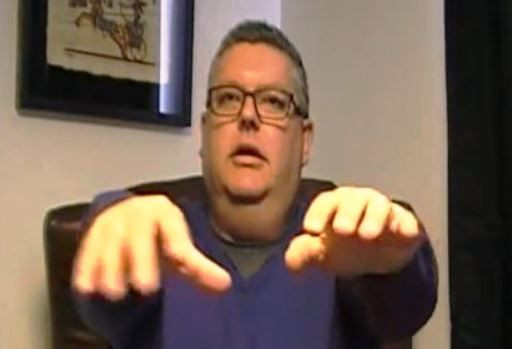Deep Brain Stimulation Patient Turns Off Pacemaker To Demonstrate Parkinson's Disease Symptoms [VIDEO]

Since his diagnosis with Parkinson's disease in 2009, when he was 35 years old, New Zealand blogger Andrew Johnson had suffered progressively more debilitating motor symptoms like tremors and impaired balance.
His motor coordination became so impaired that last year, he opted for a cutting-edge surgical treatment that is becoming increasingly common among Parkinson's disease patients: deep brain stimulation (DBS).
This groundbreaking technique involves the implantation of a pacemaker in the motor region of the brain, which is programmed to deliver steady electrical pulses to surrounding tissues in order to stop tremors.
Johnson underwent one implant surgery in November 2012, as well as a follow-up operation to insert a second probe in February 2013. After four months of living with the pacemaker brain implants, he said on Youtube that deep brain stimulation "has been hugely beneficial to his quality of life."
He has chronicled his life with Parkinson's disease on his blog YoungAndShaky in the past year, and is now drawing attention online for discussing his experience on the social media websites Youtube and Reddit.
In a remarkable video posted to Youtube last week, the now 39-year-old Johnson displays what happens when he turns off the remote-control-operated pacemakers.
The effect is dramatic. When the pacemaker runs normally, Johnson can keep his arms completely still while extended, then rapidly wiggle his fingers to demonstrate his motor reflexes.
After pressing the "off" button on the pacemaker remote control, his tremors begin almost instantaneously. His hands uncontrollably shake, his voice begins to waver, and his neck twitches with muscle dystonia.
Over the course of only one minute, the tremors increase in intensity until Johnson is close to dropping the remote control. When he finally manages to press the button, the tremors stop automatically.
"If anyone is considering DBS," he says as he takes a deep, calming breath, "I thoroughly recommend it — it's life-changing."
Johnson's video is just the latest example of DBS video footage going viral online.
Last month, UCLA surgeons made waves when they live-streamed videos and photos of the DBS brain surgery of 39-year-old Brad Carter on the social media platforms Vine and Instagram, culminating in the Parkinson's disease patient playing guitar while he was still under the knife in order to test the pacemaker implant's effectiveness in calming his tremors.
Johnson acknowledged on Reddit that the brain pacemakers aren't perfect — airport security scanners can sometimes turn them off, so he needs to warn officers about his condition so they can pat him down instead.
He actually made the video in preparation for an upcoming plane flight, he wrote in a blog post — he had never before turned off the pacemaker, and wanted to record what happened.
Johnson clarified that DBS pacemakers do not cure Parkinson's disease, but avoid some of the undesirable effects of drugs like L-Dopa — "it doesn't stop or slow the disease it just replaces the effects of the medications I take (which have long term evil effects)."
The long-term effects of deep brain stimulation are unclear, the immediate quality of life improvement makes Johnson willing to take the risk of future drawbacks, since it allows him to enjoy time with his wife and two children in their Auckland home.
"For me, my kids are 3 and 6, so the risk of dying/stroke etc were outweighed by the fact that my kids deserved a dad for as long as they can and my wife deserved her husband back so this has given them that," he explained on Reddit. "So long may it last I say."



























